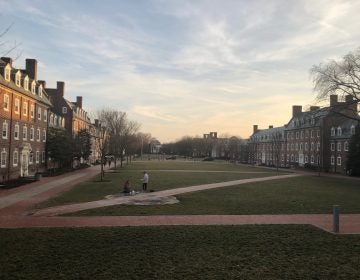Protesters of Del. education cuts want bigger income tax increase
Listen 0:59A small but determined group of educators, parents and advocates descended Tuesday to the steps of Legislative Hall protest Gov. John Carney’s proposed $37 million in education cuts.
The message by about 50 educators, parents and advocates was was simple: cuts will hurt children, make educators jobs far more challenging and adversely affect Delaware’s future.
Their solution: raise income taxes.
Lawmakers are already considering proposals to increase state income taxes across the board but the protesters want them raised even higher so Carney’s cuts can be averted.
“We can’t have our state make these cuts. We can’t afford to fail our children right now,” said Eugene Young, runner-up in the 2016 Democratic mayoral primary and founder of Network Delaware, a nonprofit agency that helped organize the rally in Dover.
With so much at stake and just 10 days to go until lawmakers must by law pass a balanced budget, partiipants and speakers lamented the smaller-than-expected turnout. Organizers said they should have done a better job of promoting the event in a state where schools employ 19,000 people.
“There should be 1,000 people here,” Young said.
Added Mary Schorse, president of the Christina School District PTA: “I was hoping for hundreds but this is definitely a great start.”
What the group lacked in numbers they tried to make up in passion, though.
A handful carried signs. “It’s easier to build strong children than repair broken men,” read one. Said another: “Invest in Education, Invest in the Future.”
They also handed out index cards and stickers that said, “No Sacrificing Our Kids, Schools, Future.”
Mike Matthews, an elementary school teacher and incoming president of the state education union, said it’s time for serious, structural change in Delaware government financing and taxation policies.
“Stop kicking the can down the road in the name of expediency,” Matthews said, his words intended for the lawmakers inside the towering brick building behind him.
“Politicians need to take positions that may challenge their incumbency,” he said. Making the hard choices to charge residents more in income and/or property taxes to make public schools competitive might cost them votes “but it makes our schools better funded.”
Even though $37 million is roughly 3 percent of the $1.2 billion the state would allocate for education next year, Matthews echoed other speakers and protesters who said cutting that amount would lead to unmanageable class sizes.
“Teachers are confronted with students on a spectrum of abilities, a spectrum of emotional and behavioral needs and when you are a teacher in a class with more than 25, 30, in some cases 35 kids in some of our secondary schools, it dilutes your effectiveness in being able to meet the needs of all the students.”
Schorse said the bottom line is that cuts will further hamstring Delaware’s ability to educate children properly.
“It’s impossible not to affect the classroom and student learning,” she said. “Delaware on the whole is already kind of average in terms of educational outcomes and it’s highly doubtful that less money for education is going to make the system any better.”
With education costs rougly one-third of the state’s general fund budget, Carney has gambled that schools would be able to absorb a relatively small part of the cuts in his “shared sacrifice” budget.
Carney’s spending plan is a mix of reductions and tax and fee increases designed to erase a projected deficit of nearly $400 million he inherited upon taking office from two-term incumbent Jack Markell in January.
But for educators and students, the $37 million is a big deal. Losing that money, educators say, would cost hundreds of teachers their jobs and lead to elimination or reduction in academic, arts and sports programs.
Some districts, such as Red Clay, are trying to absorb the cuts through attrition, but would not be able to fill many jobs when teachers retire. Other districts, such as Christina, Colonial and Appoquinimink, have already sent layoff notices to educators and other staff.
Carney’s office did not return calls Tuesday to discuss the school funding issue.
One significant effort to restore the money so Carney’s cuts won’t be imposed have stalled.
That bill, proposed in May, seeks to let school districts raise property taxes every two years without taking the usual step of going to voters in a referendum. The increase would be tied to the Consumer Price Index for Urban Wage Earners and Clerical Workers, which was 2.1 percent last year. Additional increases beyond the index would need to be approved in a referendum. But the bill’s sponsors have decided to hold off on getting a vote until lawmakers reconvene in January.
Carney’s budget has a controversial provision lets districts claw back their proportional share of $22 million of the proposed cuts by letting school boards levy a one-time, so-called “match tax” without going to referendum.
School board members and superintendents have said they fear such a move would alienate voters when they must go to referendum for operating expenses, major construction projects and other initiatives.
WHYY is your source for fact-based, in-depth journalism and information. As a nonprofit organization, we rely on financial support from readers like you. Please give today.



